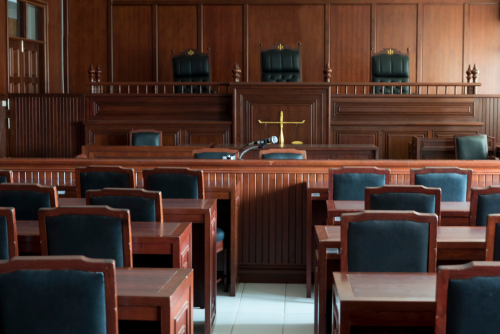'Are you serious, judge?' Twice-asked question leads to lawyer's public censure

Image from Shutterstock.
Updated: A state appeals court in New York has imposed a public censure on a lawyer who responded to a question with a question during an oral argument before a federal appeals court in December 2019.
“Are you serious, judge?” responded the lawyer, Todd C. Bank, twice. He also commented, “I see that you read the briefs thoroughly.”
Bank, whose office is in Kew Gardens, New York, was publicly censured in a June 1 order and opinion by the Appellate Division’s Second Judicial Department of the New York State Supreme Court.
The Legal Profession Blog has highlights from the opinion.
The censure follows a May 2021 public reprimand by the 2nd U.S. Circuit Court of Appeals at New York for the same behavior. The state court’s appellate division cited the 2nd Circuit’s conclusions in imposing the reciprocal discipline.
Bank began his 2019 federal appeals court presentation by stating that his argument had been thoroughly briefed, so he would take questions, according to previous coverage. His admittedly “acrimonious and insulting” responses followed a question by Judge Denny Chin of the 2nd Circuit about the injury suffered by Bank’s client.
After argument by the opposing counsel, Bank tried to give a rebuttal, but he was told by the circuit judges that he waived it.
Bank then appeared to disrupt the proceeding by failing to be seated, resulting in an order for him to leave the courtroom. The transcript, however, supported Bank’s contention that he didn’t hear an order to leave, and he didn’t knowingly disrupt the hearing, the 2nd Circuit had concluded.
After Bank was removed from the courtroom, “he was loud and argumentative towards the court security officer and failed to comply with the officer’s instruction to enter an elevator until the officer escorted him,” the appellate division opinion said.
Bank at first told the 2nd Circuit that his comment about reading the briefs reflected his “understandable frustration” with Chin’s question. He also said he hoped that he would learn from the experience, and he hoped the court would do so, as well.
But he was more contrite when responding to an order to show cause by a 2nd Circuit grievance panel. In a written declaration, Bank said he had worked hard on the case, and he allowed his emotions to get the best of him during oral argument.
“Since receiving the order, I have listened to the court’s audio file of the oral argument several times, and each time I was shocked and embarrassed at how I sounded. I am ashamed of my behavior and am profoundly sorry for having acted the way I did. I accept responsibility for my actions, which were acrimonious and insulting.”
Bank also said he apologized if he offended the court security officer, “as there appears to have been a brief misunderstanding regarding the process of my leaving the courthouse.”
Bank added that he has learned from the experience, and he hopes to look back on it as “one that spurred important self-improvement.”
The 2nd Circuit noted that Bank had no disciplinary history. It did, however, list in its order to show cause three other sanctions imposed by other courts.
Bank was sanctioned twice by the U.S. District Court for the Eastern District of New York, once for filing a time-barred complaint and once for failing to attend a court-scheduled deposition.
And he was sanctioned by the U.S. Court of Appeals for the Federal Circuit for a frivolous appeal involving a claim that a restaurant’s trademark was “demeaning to goats” because it depicted goats on a grass roof.
The 2nd Circuit said the other court sanctions were “minor aggravating factor[s] since the number of instances [are] limited and we believe that Bank, from a subjective perspective, did not act in bad faith.”
Bank told the state appeals court that the conduct resulting in 2nd Circuit discipline “was from ‘one of literally more than a thousand’ court appearances in his nearly 25 years of law practice.” He said his discourtesy was a “one-time occurrence that was not premeditated.”
Bank told the ABA Journal that he didn’t think that he was loud during his interaction with the court security officer, and it is “debatable” whether he was argumentative. He also said he didn’t refuse to enter the elevator, but the assertion may be due to a misunderstanding.
Bank said he thought that the security officer told him to wait for her to open the door into the courthouse hallway where the elevators are, so he stood and waited. She then asked him why he wasn’t opening the door. At most, he said, he misheard what the security officer told him to do.
He also said the case involving the goats was not a trademark claim over a goat drawing or logo. Rather, it was a trademark claim involving placing live goats on a grass roof.
Updated June 2 at 1:05 p.m. to include Bank’s comments.



